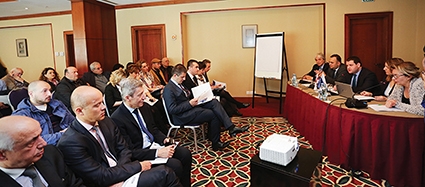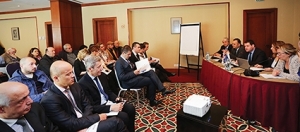Georgia on the Road to Standardization
The National Agency of Standards and Metrology of the Ministry of Economy and Sustainable Development of Georgia organized a seminar about Georgia - EU Cooperation and the role of standardization, held in Courtyard Marriott Tbilisi, focused on discussing the reforms Georgia is implementing towards aligning itself with the best existing EU practices.
The representatives of the Management Center (CCMC) of the CEN-CENELEC (European Committee for Standardization - CEN and European Committee for Electrical Standardization - CENELEC), Deputy Minister of Economy and Sustainable Development, Genadi Arveladze; General Director of Standards and Metrology Agency of Georgia, David Tkhemaladze; Ivane Didberidze from ISO Consulting Georgia, Georgian expert, trainer, and auditor on Quality and Food Safety Management Systems at Lloyd's Register Quality Assurance; Peter Lakatos, PHD and Key Expert in Technical Standardization in Georgia; and various other local and international organization and business representatives united to discuss Georgia’s progress towards European standardization.
European standards organizations CEN and CENELEC have not only been in charge of standardizing the technologies of the various European countries, but also of creating European standards as close as possible to ISO and IEC standards. For the European Union, the world market is always of the highest importance.
Deputy Minister Arveladze talked about the support Georgia receives from the EU regarding infrastructure quality and institutional development, “The Standards and Metrology Agency of Georgia serves to implement European standards in the country, in order for local production to bring high quality products to the international market,” he said.
With commonly applied standards, European Standardization organizations and national bodies and international organizations, are addressing the safety and protection of customers in Georgia. Standards facilitate cross-border trade and encourage technological advances, environmental protection and help enterprises to develop.
“The potential for standardization is almost inexhaustible,” Arveladze said. “Standardization facilitates business processes and will allow Georgian exporters to introduce their production to the EU market and enjoy the preferences granted under the Free Trade Agreement between Georgia and EU,” he added.
“Since the signing of the DCFTA between Georgia and EU, Georgian goods and services have the incredible opportunity to enter the EU market by meeting the specific requirements for Quality and Safety- by using internationally recognized ISO & EN standards,” said Didberidze. “We work toward this goal to support local business to meet those requirements. The other slice of the pie is the value of brand names and trademarks and how far standardization contributes to this. Supposing that standardized products are accepted by the customers, especially if they conform to international standards, such products can add to the value of a brand name, even if it appears hard to manifest this in everyinstance…by receiving an international ISO 9001, ISO 22000 or other Management System certificate, the company crosses some barriers to trade in the EU. At the same time, it gives more credibility to the companies from the point of view of customers".
The Ambassador of the Slovak Republic to Georgia, Rudolf Michalka, joined the conference along with the Deputy Minister of Economy to support standardization - an important basis for trade. This can be a start for the participation of Georgian national technical experts in the work of the national technical committees in EU countries, as observers and as the national standardization body of Georgia.
The Ambassador, alongside representatives from CEN, CENELEC, highlighted that Georgia's key macroeconomic vulnerabilities include risks to external and fiscal sustainability. “The EU wants to see Georgia as a stable and prospering companion. The EU cooperates with Georgia in the framework of the European Neighborhood Policy and its eastern regional dimension, the Eastern Partnership. The key goal is to bring Georgia closer to the EU. Only the realization of industrial projects and the economic development of Georgia is close bundled with an active standardization policy that promotes standards as a means to better determine and raise the competitiveness of the diligence,” they said.
Nana Beraia, a Georgian Medical Doctor and Master of Business Administration, specializes in standardization and quality management systems as a consultant. She has been involved in many European and international projects. “I see the role of standardization in the healthcare as a powerhouse of knowledge and co-creation, ensuring that the standards and assessment programs people rely on are relevant, rigorous and results-oriented,” Beraia said. “Globally recognized standards help health systems development and assess critical issues such as governance, leadership, infection prevention and control, and medication management, which all bear on the quality of services that the public gets. These standards create a stable healthcare structure that the public, suppliers and policy makers can rely on, securing high-quality health services where it counts, to the highest degree”.
Peter Lakatos, Key Expert working on Technical Standardization in Georgia, training technical offices, and having extensive knowledge and experience in the field, explains why standardization is so important:
“For European standards, safety is very important. The problem for Georgia is how to activate and involve experts from different national committees to work together on the issues of standardization. Althought the personnel in agencies are very skilled and qualified, Georgian experts should be working more with the national committees. The role of our project was to train staff to be able to work with intenational and EU organizations, though working on the national level is equally important. Safety, for example, should not only be a matter of economic interest, but has to be a social fact,” he stated, adding that having regular inspections and market surveillance are much needed in Georgia.
The role of technical standardization is to manage the technical environment.
“Georgia has a huge advantage compared to other post-soviet countries, but in order to attract foreign capital to your country, the products entering the EU and international markets should have the highest standards. When you put a product on the market it should be safe and the customer should need it. Technical standardization can be applied everywhere, be it the energy sector, metallurgy or transport- and also in social responsibility,” Lakatos concluded.
Nino Gugunishvili











